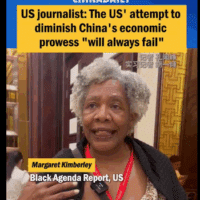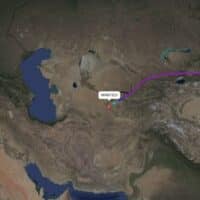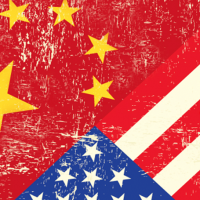-
Trump and China in Brazil
Brazil’s collaboration with China has been flourishing. President Lula traveled to Beijing in May for his third bilateral meeting with China’s president, Xi Jinping, since returning to the presidency in 2023, declaring that “our relationship with China will be indestructible.”
-
Taiwan’s voters reject anti-Chinese recall plot
In January 2024 Taiwan’s current President Lai Ching-te won the election against two other candidates. (Taiwan has no run off elections.)
-
Black Agenda Report at the Belt and Road Journalism Forum in China
The 2025 Belt and Road Journalists Forum in China was an opportunity for Black Agenda Report to join an international group of journalists working to promote meaningful dialogue on world issues.
-
What is BRICS and where is it going?
How internal divisions and geopolitical realities are shaping the bloc’s role in a rapidly transforming global order.
-
The Costs of Covid
The Covid pandemic’s onset prompted speculation that the disease had been created in a lab in China, specifically as a weapon against the United States. This new and highly contagious virus did wreak profound socioeconomic trauma and widespread suffering, borne disproportionately by the disadvantaged. Initially it caused nearly 1.2 million deaths in the United States. […]
-
Who says a chicken feather can’t fly up to Heaven?: The Twenty-Eighth Newsletter (2025)
China showcases a number of promising developments in the construction of socialism–though not without challenges and contradictions.
-
China strikes Diabetes
Diabetes is a silent epidemic, causing death and suffering on an unimaginable scale.
-
China is not a monolith
The Communist Party and socialist construction.
-
The New Silk Road and the threat to American domination
The little-reported opening of a major rail link between China and Iran may upend the strategic calculations behind U.S. imperial policy in the Middle East, argues Kevin Crane.
-
Russian and Chinese Military cargo planes shuttling weapons, missiles, supplies into Iran
Russian and Chinese Military Cargo Planes are shuttling “support” to Iran: Weapons systems, air defenses, missiles, and so forth.
-
Nicaragua and China break ground on landmark Solar project to power water access and energy sovereignty
Nicaragua, with Chinese financing, launches its largest solar plant to date—powering water systems, cutting energy costs, and deepening South-South cooperation on infrastructure for social good.
-
U.S. demands Asian allies prepare for “imminent” war against China
U.S. Defense Secretary Pete Hegseth laid down the law to military allies and partners throughout the Indo-Pacific: “Dramatically escalate your military build-up and put yourselves on a war footing for conflict with China.”
-
Is China finally breaking the U.S. stranglehold?
The U.S. is in desperate economic and military “competition” with China and has lost a lot of ground fast.
-
After Trump’s Harvard ban, China invites students with offers
Harvard faces legal and political turmoil after Trump revokes its ability to admit foreign students, but China responds with open offers.
-
Don’t believe the New Cold War lies, China is leading the world in climate solutions
At the time of the 1949 revolution, China was largely an agrarian society with widespread poverty, famine and lack of infrastructure.
-
Analysis: Clean energy just put China’s CO2 emissions into reverse for first time
For the first time, the growth in China’s clean power generation has caused the nation’s carbon dioxide (CO2) emissions to fall despite rapid power demand growth.
-
As U.S. military prepares for war on China, Silicon Valley tech oligarchs are profiting
The U.S. military is preparing for war on China. It has missile systems in the Philippines aimed at major Chinese cities. Defense Secretary Pete Hegseth says the USA is turning “Japan into a war-fighting headquarters”. Silicon Valley Big Tech oligarchs are making hugely profitable investments.
-
Absolute car crash
As a trade tariff war erupts across the globe Kevin Crane examines the prospects and challenges of the UK and European vehicle manufacturing sector.
-
Smashing walls, building firewalls, and breaking the digital siege
On October 7, 2023, the Palestinian resistance in Gaza launched Operation Al-Aqsa Flood—a mass breakout from the open-air concentration camp in which 2.3 million people had been confined by seventy-five years of Zionist colonialism and sixteen years of unrelenting siege.
-
US Imperialism in Crisis: Opportunities and Challenges to a Global Community with a Shared Future
1. Introduction The predominance of US economic, political and military power in the world was established at the end of the Second World War.1 With just 6.3 percent of global population, the United States held about 50 percent of the world wealth in 1948. As the only power which had used nuclear weapons on civilian […]












![US Defense Secretary Pete Hegseth delivers his speech during 22nd Shangri-La Dialogue summit in Singapore, Saturday, May 31, 2025. [AP Photo/Anupam Nath]](https://mronline.org/wp-content/uploads/2025/06/d8d41196342825408135009d3484cc5d0bebb8b5-200x200.png)







![A late 1940s Soviet poster showing a US military service member lounging on top of a German factory, smoking a cigar. The text beneath reads DER DOLLARIMPERIALISMUS [dollar imperialism].](https://mronline.org/wp-content/uploads/2025/04/Confuse_and_Control_Department_of_State_Publication_4107_1951_-_Soviet_propaganda_line_-_Dollar_imperialism_the_enemy_of_the_German_people-e1744342177232-200x200.png)